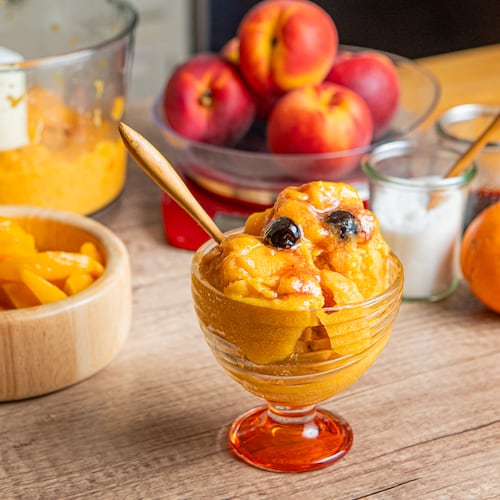This Monday could be big for some prominent Atlanta chefs : Steven Satterfield of Miller Union and Kevin Gillespie of Gunshow and Revival are both James Beard Award finalists for Best Chef: Southeast, and Sean Brock, who opened his first Atlanta restaurant with Minero in Ponce City Market last fall , is a finalist in the Outstanding Chef category.
If you're having trouble getting a table at these hot spots, make like a James Beard winner in your own kitchen with these recipes from the AJC archives from Satterfield, Gillespie and Brock.:
Steven Satterfield:
A signature dish of the much-praised West Side restaurant, this criminally rich concoction makes for a sensational starter course, a main attraction at brunch or, as Satterfield suggests, an accompaniment to braised beef and sauteed greens.
Miller Union's Baked Farm Egg in Celery Cream
Hands on: 15 minutes Total time: 50 minutes
Serves: 2 appetizer portions or 1 entree
2 ribs celery, roughly chopped, including leaves
1/2 small onion, sliced, including skin
1 shallot, sliced, including skin
1 teaspoon kosher salt
3 peppercorns
1 small bay leaf
1 sprig fresh thyme
1/3 cup heavy whipping cream
1/2 teaspoon butter
2 fresh eggs
4 to 6 pieces of crusty bread, brushed with olive oil and grilled
Preheat oven to 350 degrees. In a medium saucepan, place celery, onion, shallot, salt, peppercorns, bay leaf and thyme. Pour in cream, and stir gently. Place pan over low to medium heat and slowly bring to a simmer. Once the cream is quite hot, remove from stove and cover. Allow to steep 15 minutes or longer.
While cream mixture is resting, grease 2 ovenproof ramekins or shallow bowls with butter. Crack 1 egg into each dish, taking care not to upset the yolk. Strain the cream mixture into a small bowl, pressing down on the solids. Taste and adjust seasonings. Spoon half the liquid over each egg. (It's OK if the yolk is protruding slightly.)
Bake in oven for about 6 minutes or longer, taking care not to overcook. (Depending on your oven and the depth of the dish, it may take as long as 10 to 12 minutes.) When the egg and cream mixture has just set, place the dishes under the broiler to finish, about 3 to 5 minutes. (Ideally, the yolk will be a little runny, but you can decide how firm you want it.) Remove from oven and allow to rest 1 minute. Serve with the bread. (A note on cooking the bread: You don't need a grill. Just pour a bit of olive oil into a heavy skillet or griddle and brown bread on both sides.)
Per serving: 427 calories (percent of calories from fat, 61), 12 grams protein, 30 grams carbohydrates, 2 grams fiber, 29 grams fat (13 grams saturated), 269 milligrams cholesterol, 959 milligrams sodium.
Rutabaga Gratin
Hands on: 20 minutes Total time: 1 hour Serves: 6
Satterfield created this recipe to highlight one of his favorite vegetables. Your grandmother might have called this scalloped rutabagas.
2 tablespoons unsalted butter, divided, plus more for buttering baking dish
2 medium rutabaga, peeled and thinly sliced (about 2 pounds)
Kosher salt
1 teaspoon fresh thyme leaves
Freshly ground black pepper
1 cup chicken broth, more if needed
1 cup heavy cream
2 cups bread crumbs made from day-old baguette or French bread
2 tablespoons extra-virgin olive oil
Preheat oven to 350 degrees. Butter an 8-by-11-inch baking dish.
Place a layer of thinly sliced rutabagas evenly across the bottom of the prepared baking dish. Season uniformly with kosher salt, then dot with tiny pats of butter and sprinkle with thyme and black pepper.
Begin another layer. Season as before with salt, butter, thyme and pepper. Continue this process until all rutabaga is used and each layer is seasoned evenly.
In a 2-cup measuring cup, combine broth and cream and pour over the vegetables. The liquid should come just to the top of the vegetables. Add more broth if needed. Toss the bread crumbs with olive oil and season with salt and pepper. Scatter evenly on top of the vegetables. Gently press down on crumbs so they become evenly moist. Bake 40 minutes or until rutabaga is tender when tested with a paring knife. Allow to sit 20 minutes before serving.
Per serving: 379 calories (percent of calories from fat, 59), 8 grams protein, 32 grams carbohydrates, 2 grams fiber, 25 grams fat (13 grams saturated), 65 milligrams cholesterol, 368 milligrams sodium.
Kevin Gillespie
This slow-cooked barbacoa from Gillespie's cookbook "Pure Pork Awesomeness: Totally Cookable Recipes from Around the World" (Andrews McMeel Publishing, $29.99) can be enjoyed in a Cuban sandwich for dinner on Sunday night, nachos for lunch on Monday and tacos on Taco Tuesday.
It's packed with pungent spices, including clove and cinnamon, with a little kick from the chili powder, and the method of roasting in the oven keeps the meat moist.
Gillespie notes that instead of Boston butt, you could use the picnic part of the shoulder, or use the whole shoulder if you have one.
Just trim the fat down to 1/8-inch or so.
Slow-Cooked Pork Barbacoa
2 Tbsp. kosher salt
1 Tbsp. ancho chili powder (or other single chili powder, not a blend)
1/2 tsp. ground cinnamon
1/4 tsp. ground cloves
5 lb. bone-in pork shoulder
1 onion, quartered
10 cloves garlic, peeled
3 dried bay leaves
Adjust the rack in the oven to a lower level so the roast will easily slide in. Heat the oven to 350 degrees.
In a small bowl, combine the salt, chili powder, cinnamon and cloves. Pat the pork dry and generously season all over with the salt mixture.
Cut a large piece (about 24 inches) of heavy-duty foil and place in a roasting pan. Add the roast, onions, garlic and bay leaves and wrap everything up tightly in the foil. Roast for 3 1/2 hours.
Remove from the oven and let rest, still wrapped in the foil, for 30 minutes. The foil will keep all the moisture and flavors in the packet and the shoulder will braise as it cools, creating very tender and juicy meat.
Discard the onion, garlic and bay leaves before shredding the meat. Serves 12.
One-Pot Hog Supper, from Gillespie's book "Fire in My Belly" (Andrews McMeel Publishing, $40).
Ingredients:
4 tennis-ball size white potatoes, about 12 ounces
3 cloves garlic, peeled
1 softball-size onion, peeled
1 head green cabbage, about 2 1/2 pounds
6 ounces fatback, rinsed and sliced into 1/8-inch-wide strips
4 baseball size heirloom beefsteak tomatoes, cored and sliced into 1/4-inch-thick rounds
Salt
Ground black pepper
1/4 cup celery leaves, coarsely chopped and loosely packed
1/4 cup chives, coarsely chopped and loosely packed
1/4 cup fresh French tarragon, coarsely chopped and loosely packed
1 teaspoon lemon juice
1 teaspoon finishing-quality olive oil
Using a mandoline, slice the potatoes and garlic into rounds and slice the onions into lengthwise strips --- all about 1/8-inch thick.
Remove the tough, dark green outer leaves from the cabbage (save them for another use, like cabbage dumplings). Peel the inner leaves from the core and tear them into 3-inch-wide strips.
Heat a 4-quart Dutch oven over medium heat. Add the fatback in a single layer and cook until lightly browned, about 9 minutes; turn each piece and cook until lightly browned, an additional 2 minutes. Line a plate with paper towels and, using a slotted spoon, fish out the fatback cracklings to drain on the paper towels. Leave about 1 tablespoon of fat in the bottom of the pan, setting aside the rest.
In this order, layer the potatoes, garlic, cabbage and tomatoes in the Dutch oven, aggressively seasoning each layer with salt and pepper as you go. Pour 1 cup of water and 3 tablespoons of the reserved fat over the top of the tomatoes. Crank the heat up to high and bring the mixture to a boil. Cut the heat down to medium-low, cover, and simmer until the vegetables are tender, about 45 minutes. To test for doneness, take off the lid and slide a knife into the pot. The knife should easily slide through the vegetables. If it doesn't, put on the lid and continue cooking until it does. Once the vegetables are tender, take off the lid and cook uncovered until the liquid reduces in volume and sits well below the top of the vegetables, about 30 minutes more.
Pull the pot from the heat and let rest for 10 minutes.
Finely chop 2 tablespoons of the fatback cracklings and toss in a small bowl with the celery leaves, chives, parsley and tarragon. Drizzle with the lemon juice and finishing oil and season with a grind of black pepper. Toss to combine.
Sean Brock
Cornmeal-Fried Pork Chops with Goat Cheese-Smashed Potatoes from Brock's cookbook "Heritage" (Artisan, $40)
6 boneless pork chops (about 3 oz. each)
1 quart whole-milk buttermilk
Kosher salt and freshly cracked black pepper
2 cups cornmeal, preferably Anson Mills Antebellum Fine Yellow Cornmeal
Cayenne pepper
Canola oil for shallow-frying
For the Goat Cheese–Smashed Potatoes:
15 medium red potatoes (about 3 pounds), washed
Kosher salt
1 cup half-and-half
6 oz. goat cheese
8 Tbsp. (1 stick) unsalted butter, diced and chilled
1/2 cup finely sliced chives
Freshly ground white pepper
For the pork chops: Pound each pork chop between two pieces of plastic wrap to 1/8-inch thick. Place the chops in a container and cover them with the buttermilk. Cover and marinate overnight for at least four hours in the refrigerator.
For the smashed potatoes: Put the potatoes in a large pot, cover with water and add ¼ cup salt. Bring the water to a simmer over medium-high heat, reduce the heat to medium-low, and cook the potatoes until fork-tender, about 30 minutes; do not let the water boil.
Preheat the oven to 200 degrees. Meanwhile, remove the chops from the buttermilk (discard it) and season them with salt and cracked pepper. Put the cornmeal in a shallow bowl and season it with salt and cayenne pepper. Dredge the chops in the cornmeal, gently shaking off the excess, and put on a large plate.
Heat two large cast-iron skillets over high heat. When the skillets are hot, add 1/4-inch of canola oil to each and heat for 1 minute. Carefully place 2 pork chops in each skillet; do not shake the skillets or touch the chops for 1 minute. Then reduce the heat to medium-high and cook the chops until golden brown, about 4 minutes. Carefully turn the chops over and cook until golden brown and crispy on both sides, about 4 minutes more. Transfer the chops to a baking sheet and keep warm in the oven. Discard the oil in one skillet, replace it with new oil, and heat the oil over high heat. Cook the remaining 2 pork chops in the same way; transfer to the oven to keep warm.
When the potatoes are almost cooked, bring the half-and-half to a simmer in a small saucepan over medium heat. Drain the potatoes and place them in a large bowl. Using a wooden spoon, carefully smash each potato without breaking it apart. Pour the hot half-and-half over the potatoes; crumble the goat cheese and the butter over them, and fold in the chives. You should have small pockets of goat cheese throughout and the potatoes shouldn't be mashed. Season the potatoes with white pepper and serve with pork chops.
Read more stories like this by liking Atlanta Restaurant Scene on Facebook, following @ATLDiningNews on Twitter and @ajcdining on Instagram.
About the Author
The Latest
Featured


